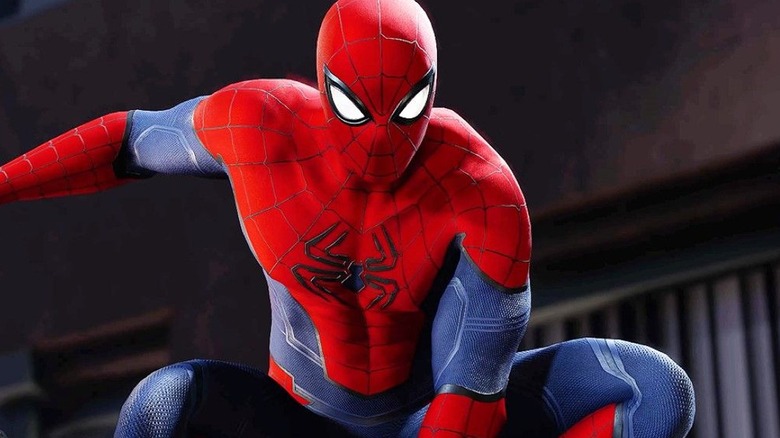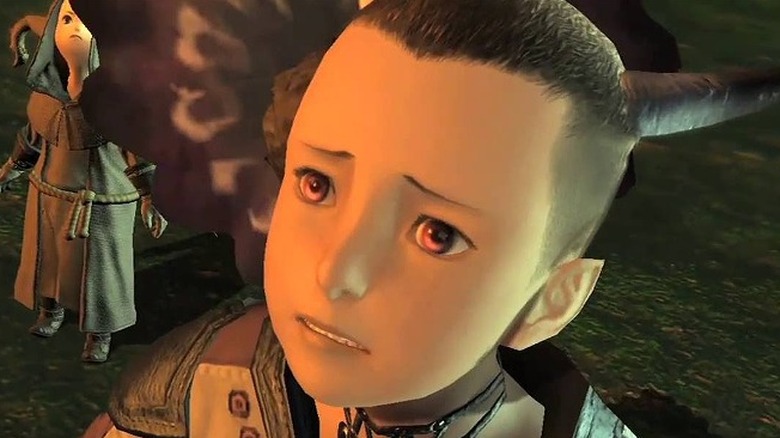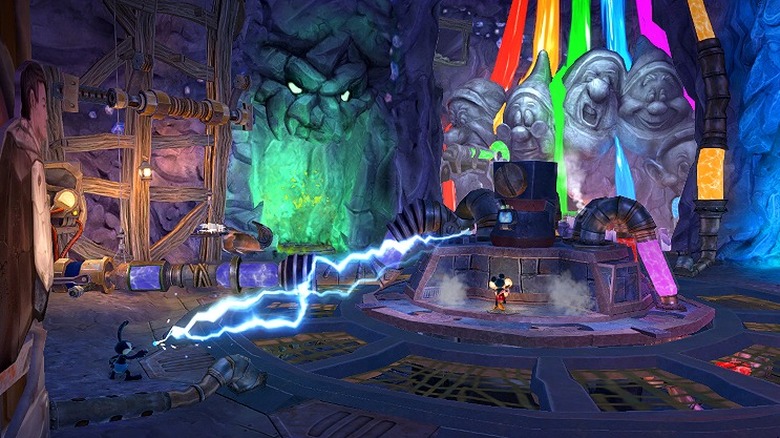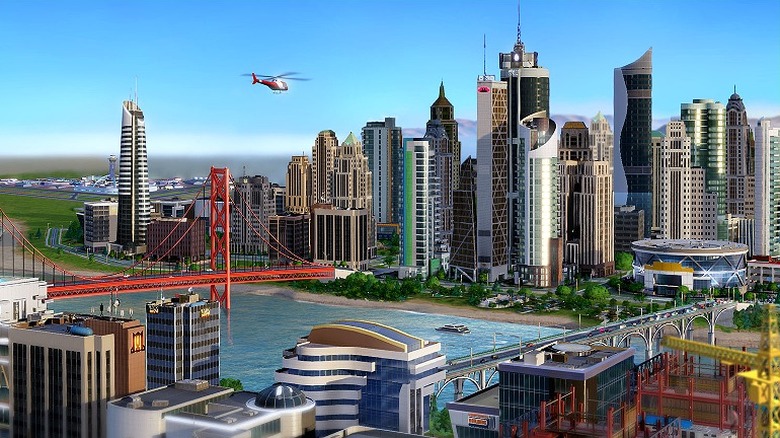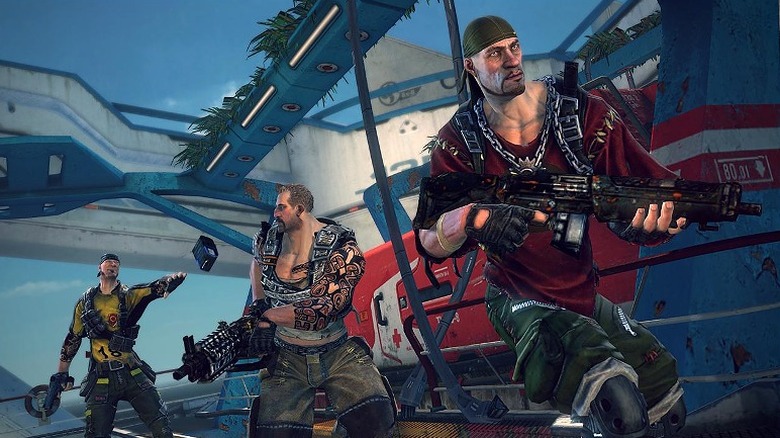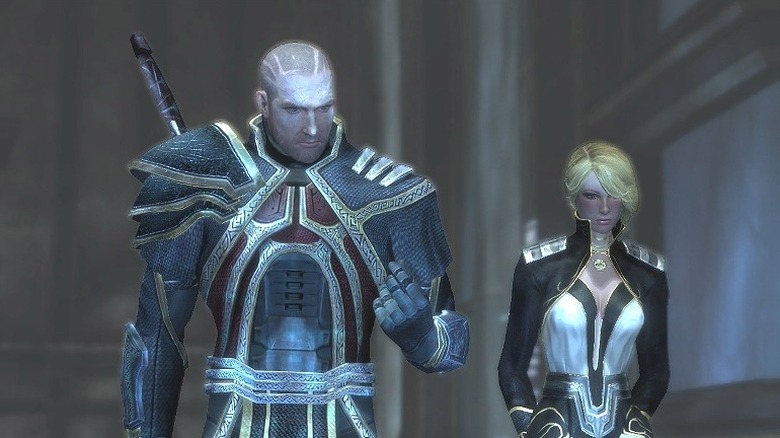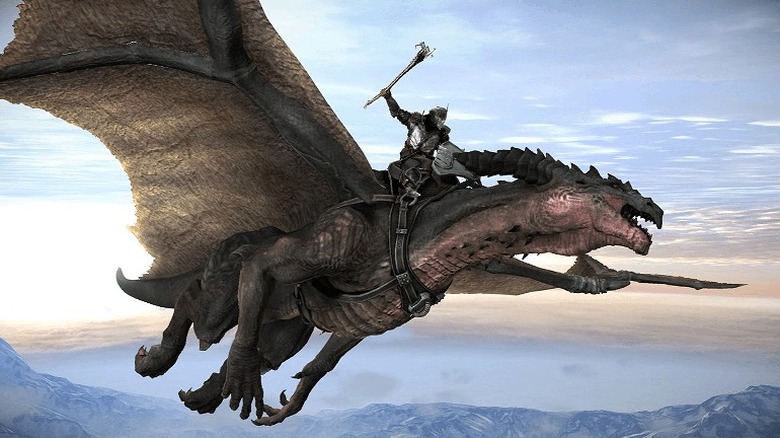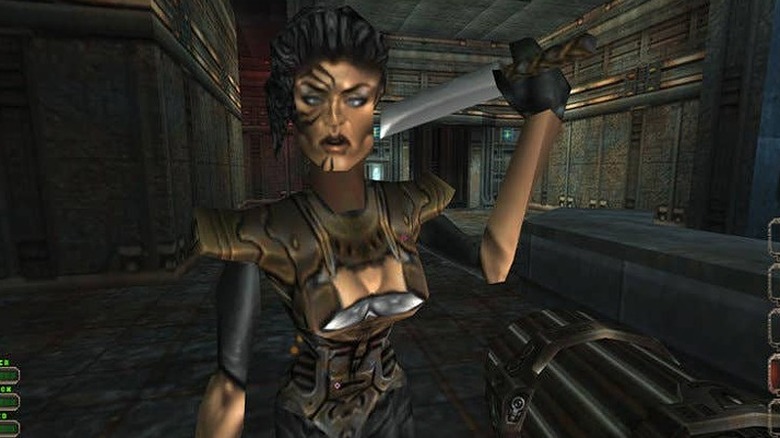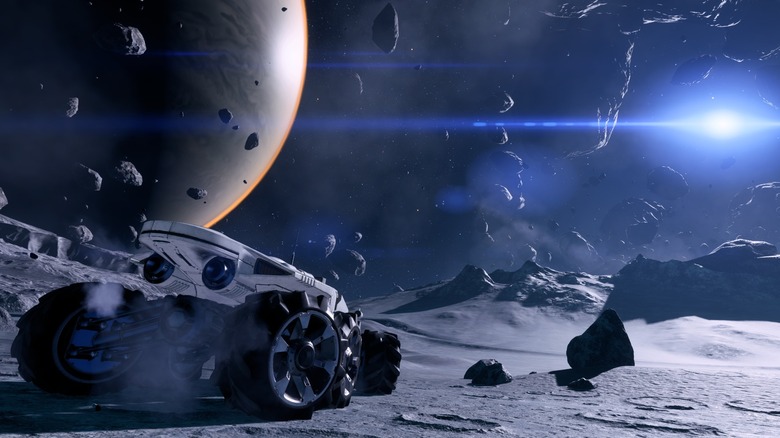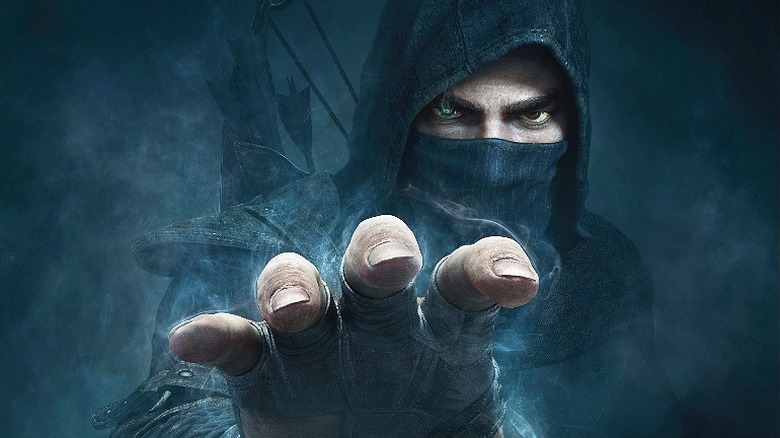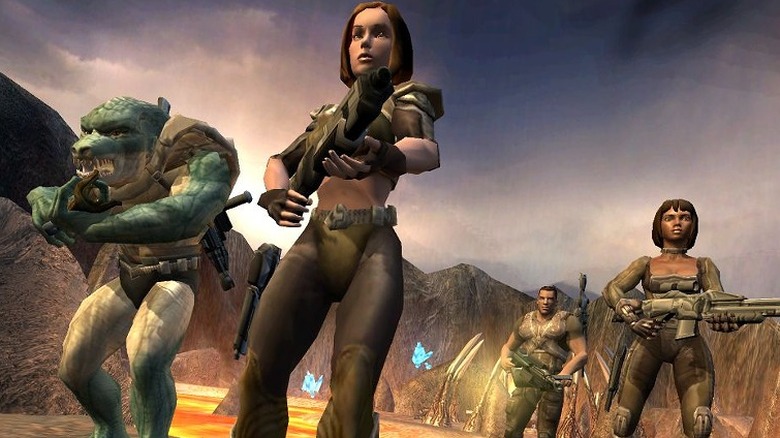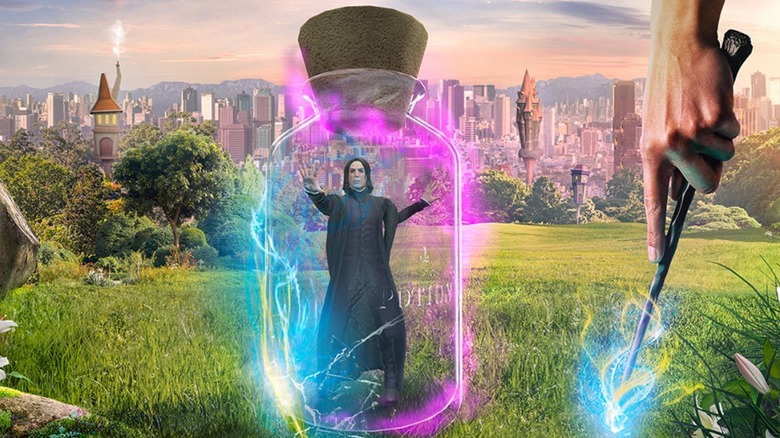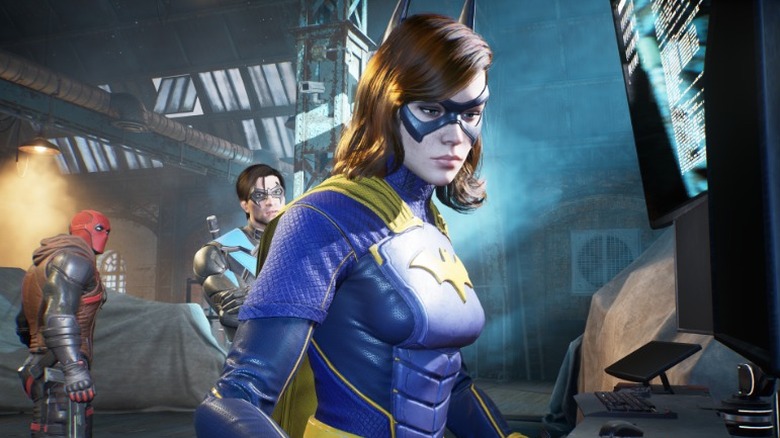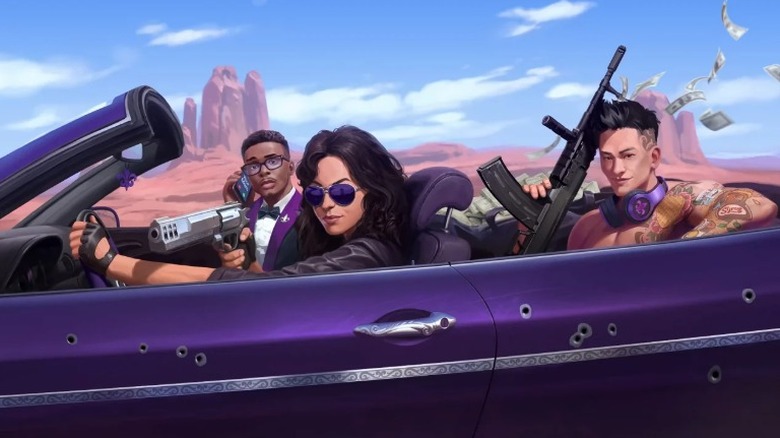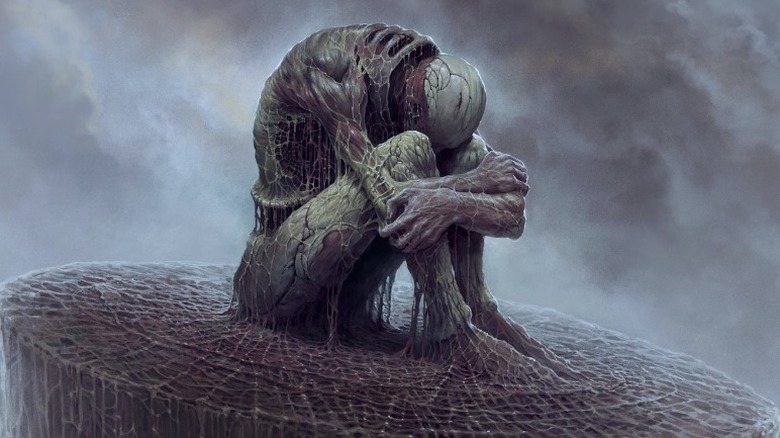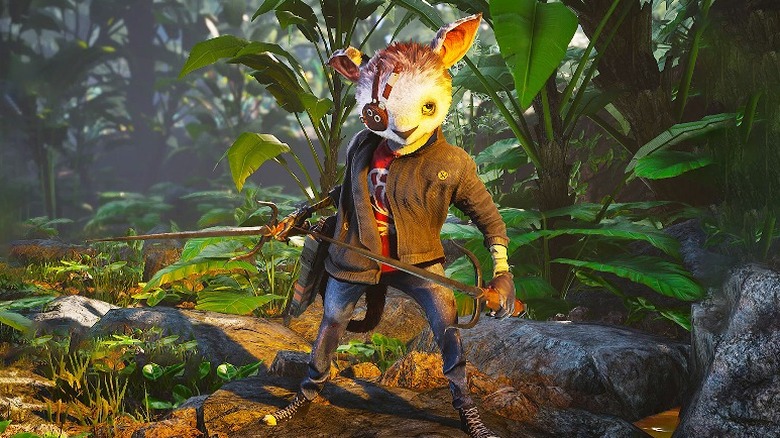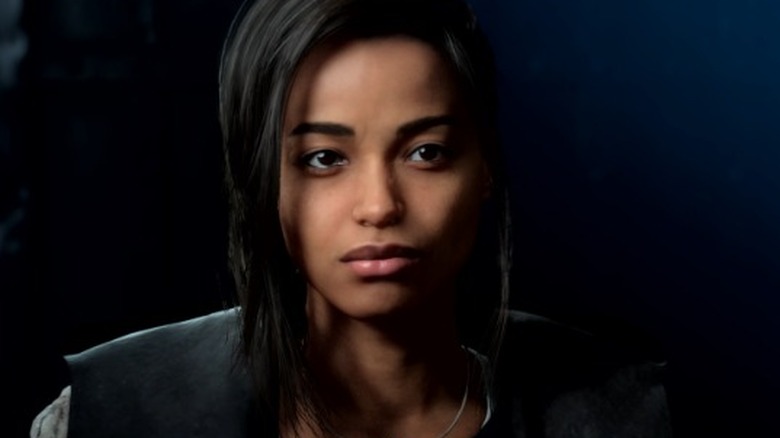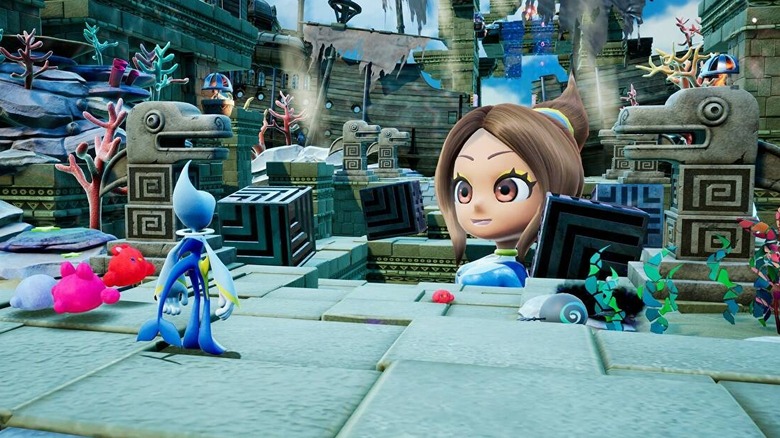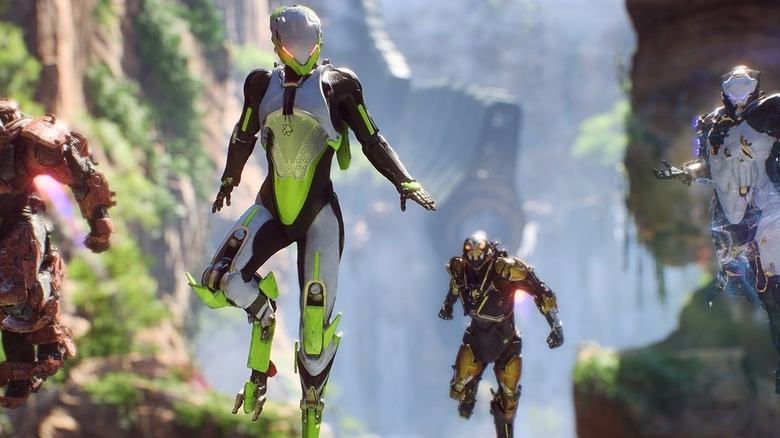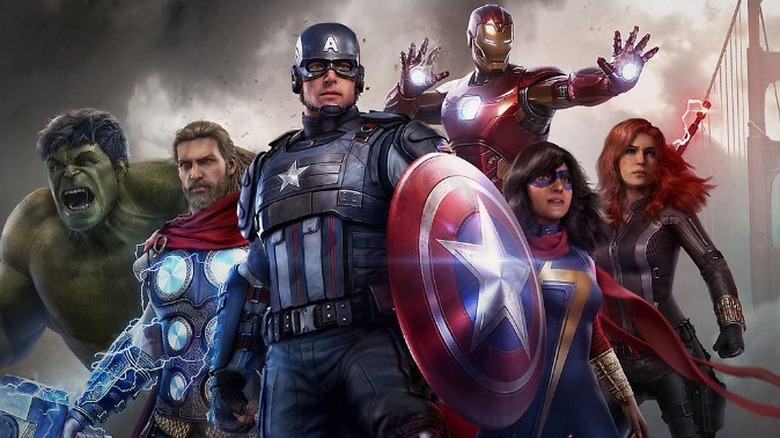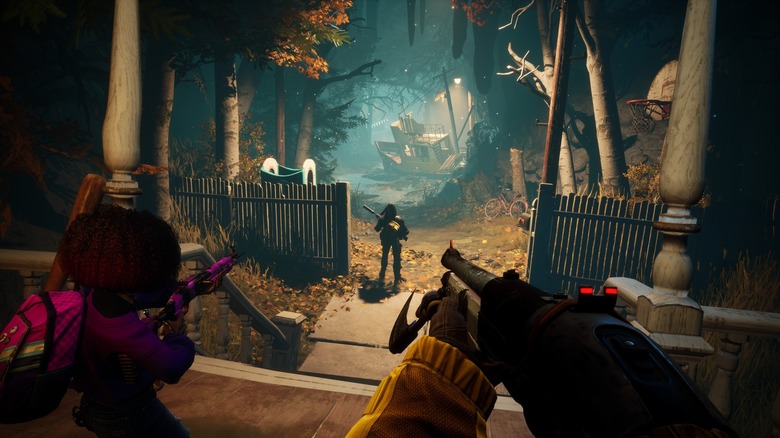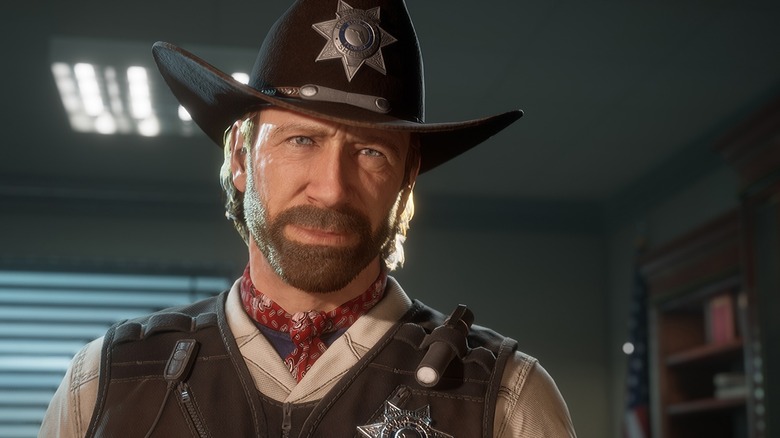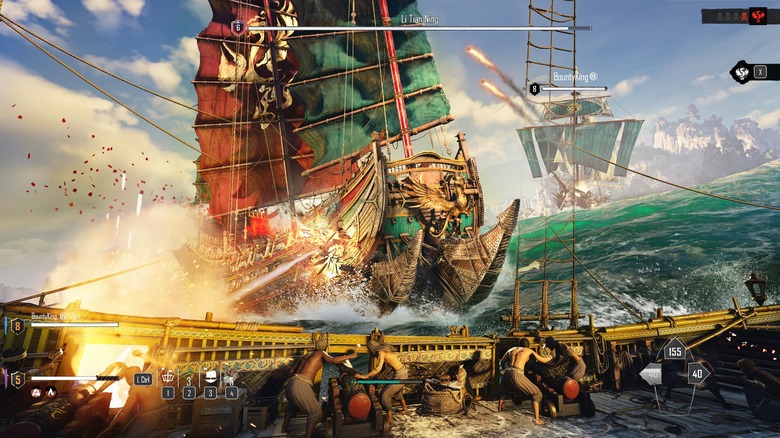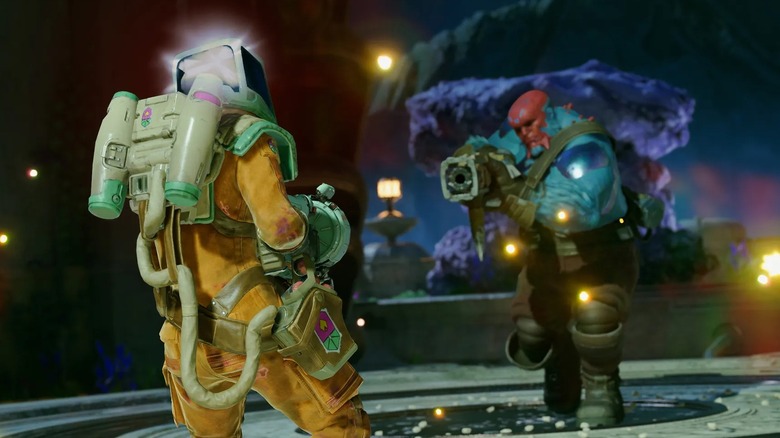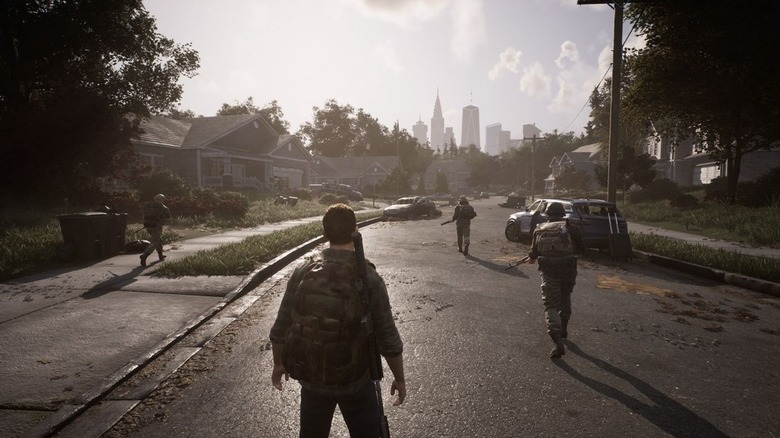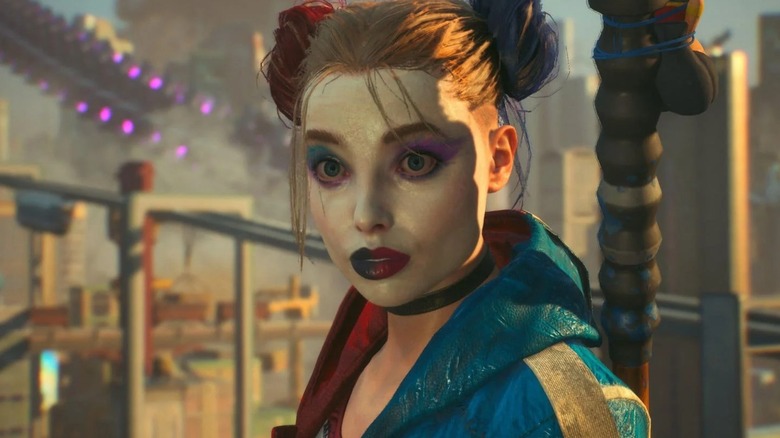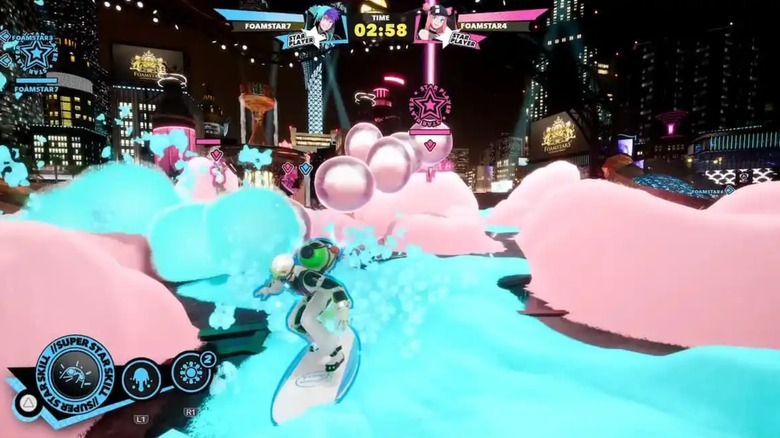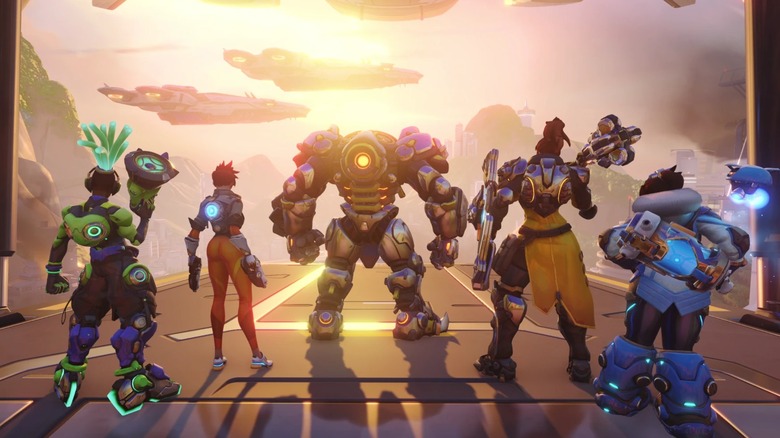Overhyped Games That Totally Flopped Hard
There's no bigger embarrassment than hyping up a game, whipping an audience into a an excited frenzy ready to preorder away, and then disappointing everyone. We know what it's like to listen to the flashy marketing schemes and promising trailers, load up the game and find that in reality, the anticipated title is at best just okay and at worst, a total flop.
It's no fun for anyone involved when a game flops. Players feel deceived, even betrayed, and the developers that promised the world have the burden of failure to shoulder. It's worse when the trailers look so sleek and the demo is so cool. Yet somehow, the game winds up impressing absolutely no one upon release. What happened? The unfortunate fact is that things go wrong along the way. Here's some games that we hyped up, hoped, and prayed would be good. But then they just weren't.
Final Fantasy 14 Online was killed by graphical quality
The world of "Final Fantasy" is beautiful and detailed. Just look at how many belt buckles the average player sports! Despite this careful crafting that developers pour into the games, as it's arguably the "unhealthy obsession with graphical quality" that effectively killed "Final Fantasy 14 Online." This MMO was Square Enix's second, and had seemed promising at first. It was definitely easy on the eyes. However, it's beauty turned out to only be skin deep. Upon its 2010 launch, the game was an all-around failure. With constant crashes and a hard limit on the number of players on screen at a time, the MMO failed basic MMO requirements. There had been a marked dichotomy in priorities by devs: they put the same number of shaders on potted plant as they did a playable character, limiting what the game could support.
After the disaster, Square Enix gave a presentation at the Game Developers Conference on exactly what went so horribly, horribly wrong. They acknowledged that the game had an unfriendly user interface, an extreme lack of content, a broken battle system, and unstable servers. They said that even with eight years of experience running "Final Fantasy 11," they were unable to recognize changes in the MMO market and user needs. It turned out that "creating a successful MMORPG sequel is harder than it looks." Fortunately, Square Enix was able to learn from their mistakes and relaunch the game in a far better incarnation.
Epic Mickey 2 didn't fix the mistakes of the past
Before "Bendy and the Ink Machine," there was "Epic Mickey," a series of games featuring Disney's favorite mouse, a magical paintbrush, and globs of malicious ink. The first game was a hit on the Wii, selling 1.3 million copies in about a month as it sketched out the story of Mickey in a world of forgotten Disney creations. It had interesting mechanics, nostalgic platforming, but despite positive reception, had some glaring gameplay issues that took it from a ten to a seven. People were also disappointed that the premise wasn't as dark as it was hyped up to be, but "Epic Mickey 2" gave Junction Point Studios another chance to clean up the camera controls, vary the missions, and make the characters more charming. Oh, well.
2012's "Epic Mickey 2: The Power of Two" definitely added some flair and charm, but failed to erase the wonky controls that marred the first game. The sequel didn't have nearly the success of the first, and flopped hard. "Epic Mickey 2" made less than a quarter of the sales of its predecessor and had largely mixed reviews. Cutscenes were cool, but they didn't make up for broken AI. The characters were more fleshed out, but tasks were mind-numbingly repetitive and boring. The good name of Disney couldn't save this bellyflop of a game or Junction Point Studios, which was shut down by Disney in 2013.
Always-online SimCity never connected
There's a reason why the steady stream of "Sims" games stopped after 2014. And it may have been because of the utter flop of 2013's "SimCity." It had the burden of a grand legacy of beloved games upon its shoulders. Previous "SimCity" titles managed to garner the admiration of amateurs and master architects alike as they built and wrecked whole interactive cities. But when it came to the launch of the 2013 reboot of the founding series of the "Sim" line, the emphasis of play was on the wreck.
The game had the ambitious aim to make "SimCity" bigger than ever. It was going to be 3D and free of everything that made previous games tedious or confusing. If that wasn't enough, EA had machinations for an always-online experience wherein players could connect their cities to that of their friends and build metropolises together. But this cool-sounding idea turned out to be a fatal flaw, because upon launch, a million people trying to play were left unable to log on. The servers couldn't handle the load and wouldn't for months and months, even as EA scrambled to add more and repair others. This meant that planned content was scrapped in favor of putting out fires, and that fans were disappointed enough to demand refunds.
Brink was on the brink of greatness
It's sad to see potential wasted, and Bethesda's "Brink" had a lot. The first-person, class-based shooter had everything that was cool at the time of ye olde 2011: a post-apocalyptic setting that commented on global warming, parkour, cyberpunk character designs, and "Team Fortress 2"-esque gameplay. And Bethesda, of course, was one of the strongest names in the business.
"Brink" could have been a hit. It could have been a favorite game to play with friends. It could have been the game that the cool kids play. So why haven't you heard of it? Reviewers just weren't sure what to make of "Brink." It wasn't bad, but it wasn't great. A sure way for a game to go quietly into the night is straddling the line between okay and mediocre. Its lackluster performance wasn't enough to incite riots, but the game definitely left players sighing as they looked back on months of anticipation. In the end, "Brink" warranted nothing more than a shrug. More recently in 2017, "Brink" was added to Steam as a free-to-play game without so much as a whisper of fanfare. A far cry from the "second-coming of shooting games" that was expected.
Too Human took too long, tried too hard
"Too Human" was compromised from within by a big-talking, overly-ambitious, argumentative studio head that led to every unsold copy of the game being wiped from the face of the planet. The game's long descent into infamy began all the way back in 1999, when developer Silicon Knights announced that they were crafting a fully 3D, futuristic game that sounded suspiciously like "Blade Runner" for the PlayStation. Then it was going to be on the GameCube — no wait, actually the Xbox 360. The game, which had undergone significant changes both mechanically and narratively was at last expected to release for the holidays of 2006. It was going to be an epic, sci-fi RPG reimagining of Norse mythology, and people were pumped. And for anyone who doubted that it would be anything less than game of the year, they had Denis Dyack, "Too Human's" biggest fan and creator, to answer to.
Dyack was well-known for getting into arguments with skeptical fans on the forum NeoGAF. But fans still had a considerably long time to wait until they were able to confirm if they were "owned by Dyack" because "Too Human" got delayed another two years, since Silicon Knights sued Epic Games, saying that their Unreal Engine 3 hadn't delivered the results they had expected. When the game flopped upon its 2008 release, Silicon Knights later bore the brunt of a double whammy: They lost their suit against Epic, and every copy of "Too Human" had to be destroyed.
Lair was something very different
Dragons are cool. Riding on dragons? Even cooler. Supposedly you can't go wrong with dragons, but looking back at the failure that was Lair proves that a game needs more substance than big, scaly fantasy creatures. "Lair" was such a flop that Sony had to try desperately to soften its deafening crash: they sent out "reviewer's guides" in which journalists were encouraged to "open your mind and hands for something very different!"
"Different" in this case was mediocre, and not at all the vision studio Factor 5 had hyped up. Along the way, the game had lost the story that the studio had been passionate about and wound up being a shadow of what could have been. Throw in the fact that the controls were practically nauseating, because for some reason it was imperative that you really felt like you had hold of a dragon's reigns, and "Lair" turned out technically unimpressive, narratively uncompelling, and internally embarrassing to Factor 5 devs.
People like Factor 5 co-founder Julian Eggebrecht lost interest in the game when it went from an open-world game to a linear story. He allegedly was an overbearing boss, and caused a few devs like designer Joe Pinney to quit. Like fans, no one from Factor 5 was happy with what became of "Lair." "'Lair' was a genuine f***-up by everybody involved, probably me the worst," Eggebrecht later said in an interview with Polygon.
Daikatana's aggro marketing didn't help
Okay, so being a big influence behind historic titles like "Doom," "Quake," and "Wolfenstein 3D" gives you some right to brag. John Romero, co-founder of id Software, has shaped gaming as we know it. He coined the term "deathmatch." He's allowed to be cocky, and the industry is also right to have high expectations for any game he hypes up. But 2000's "Daikatana" didn't deliver.
Romero was so confident in the time-traveling, futuristic RPG shooter that the ads read, "John Romero's about to make you his b****." A little aggressive, and in the light of the game's flop, downright humiliating. The game was delayed several times, but the extra time in development did little to improve the clunky gameplay, weird story, and aggravating enemies. If players didn't fall through the world into polygonal oblivion, then they had to face down the same ugly enemies again and again. Its graphics looked like that of a game that had come out five years previously, and fans were disappointed.
"You know, I never wanted to make you my b****, not you, not them, not any of the other players and, most importantly, not any of my fans," Romero later told Gamesauce magazine.
Mass Effect Andromeda tanked a franchise
"Mass Effect Andromeda" probably wouldn't be remembered as such a spectacular flop if it had been a completely original game. It has engaging combat, interesting worlds to explore, and a reasonably compelling story. The game scored a 71 on Metacritic, and if we're being honest, we've all enjoyed at least a few games in that range. But this was seen as a low rating for a BioWare game, and because the weight of the genre-defining "Mass Effect" trilogy was behind the new installment, the franchise was essentially put on ice after the game received a tepid reception from critics and fans.
When "Andromeda" debuted, the game was a buggy mess and seemingly suffered from a lack of clear direction. As it turns out, "Andromeda" had a bumpy development process, with tons of turnover and a massive amount of crunch in the last 18 months of development. At one point the devs imagined it becoming a game like "No Man's Sky," which didn't yet exist, but with the combat and story elements of the original "Mass Effect." They eventually had to scale back their vision and release the compromised game that is "Andromeda," hoping to improve on it with a sequel. The launch swiftly ended those hopes, though, as EA reacted to the reception by scaling back the size of BioWare Montreal and moving the "Mass Effect" series to the backburner.
This is one case where even solid sales didn't stop this game from being a flop in the eyes of the public. An untitled sequel is currently in the works, but time will tell if it will offer the redemption arc that fans hope for.
Thief stole our faith in the franchise
The dismal performance of 2014's "Thief" remake proves that you should never try to reinvent the wheel or well-received stealth games. 1998's "Thief: The Dark Project" was something of a revolution, and its influence has touched a myriad of games since. Instead of running in guns blazing and swords flashing, "Thief" was all about slow sneaking and light fingers. The game and its sequels had a cult following, and are still perfectly playable today. Maybe it would be better to stick with them instead of the remake that marred the series' good reputation.
Eidos Montreal's remake had to live up to some high expectations. They had years to do so, and a AAA budget, but like many a flop, something went wrong along the way. The game that was finally, finally released was worse at stealth and quick escapes than its contemporary counterparts like "Dishonored" and "Assassin's Creed." Apparently legendary master thief Garrett is unable to open windows after they are shut behind him. The world of 2014's "Thief" was a whole lot of locked doors and dead ends, with little polish to make up for bad AI and frequent bugs. Rather than stealing hearts, "Thief" stole fans' faith in an otherwise amazing series of games.
Brute Force couldn't kill Halo
"Brute Force" is a series that put gaming on the map. Countless professional gamers have been proud to participate in "Brute Force" tournaments. Everyone knows and loves Tex, one of the most recognizable characters in the medium, right? Right? Nope.
You probably don't actually remember "Brute Force," but at one time, it was trying very earnestly to be the next big thing. To be frank, it was trying to kill "Halo" by being remarkably similar to "Halo" and doing nothing to differentiate itself from being nothing more than a discount "Halo." Produced by Digital Anvil in 2003 exclusively for Xbox, the game was released before "Halo 2" and if anything, only made players more eager for Bungie's sequel. Because although "Brute Force" wasn't bad, it wasn't good. Certainly not as good as it claimed to be.
The squad-based shooter had an uninspired sci-fi plot to explain the missions in the game. The flimsy story follows Tex — who has the exact personality you would assume a guy named Tex would have — and his squad as they protect colonists on alien planets. The game was hyped up to the point that it did beat out "Halo" in terms of first-week sales. Once people got ahold of it, however, they found that the squad was unbalanced, the gameplay had gone from tactical to shoot-em-up, and that everything else about it was unmemorable — other than the poor reviews it received.
Wizards Unite couldn't overshadow another big game
"Wizards Unite" was supposed to be a "Harry Potter"-flavored version of "Pokémon GO," but it was also meant to be so much more than that. The mobile game, developed by "Pokémon GO" developer Niantic, promised players a narrative-driven adventure full of spells, magical creatures, and exploration. However, the game only lasted a few years before being unceremoniously shut down. It's hard to pin down exactly why "Wizards Unite" was a total flop, but one reason could be money. The wizarding game didn't bring in as much cash as its "Pokémon" counterpart, partially because some players didn't feel incentivized to continue playing after goals were easily met. Some gamers have argued that "Wizards Unite" was a bit too difficult and didn't offer enough of a return.
For its part, Niantic explained that "not all games are meant to last forever." That said, the developer's other game, "Pokémon GO," has had no problem lasting. Ultimately, the rocky run of "Wizards Unite" never beat out Niantic's other big game.
Gotham Knights was less than super
To be clear, "Gotham Knights" wasn't a bad game, but it did fail to live up to the massive hype surrounding it. On the surface, it had everything gamers wanted from a new Bat-game. The title promised a focus on other members of the Bat Family (like Batgirl, Nightwing, etc.), as well as all the fluid combat one could desire in an open-world setting. It sounded too good to be true – and it was.
While fans expected an "Arkham"-styled game with different main characters, the plot and combat of "Gotham Knights" left much to be desired. Critics complained that the title also had performance issues, and that it was difficult to play on some platforms. Most infuriatingly, "Gotham Knights" didn't have a performance mode. The game is also permanently capped at 30fps instead of 60fps, even on PCs, which has infuriated some fans. Gamers felt like the lack of a performance mode – paired with the game's general performance bugs – made "Gotham Knights" worth skipping. Really, though, we all know the true reason "Gotham Knights" flopped: Fans claimed that Nightwing was missing his greatest "asset" in the game.
Saints Row just didn't work
Not every game needs a reboot, and 2022's "Saints Row" proves that rule. The "Saints Row" series has a notorious reputation for being wild, wacky, and violent, full of unexpected jokes and action packed adventure. Unfortunately, the reboot fell flat for many gamers. While the original series was initially written off as a "Grand Theft Auto" clone, it eventually found its fanbase and went on to have some successful entries.
In 2022, however, the series got a reboot from Volition that went wrong. Early reactions to the game all said the same thing: It was buggy to the point of being nearly unplayable. While the reboot eventually got an update to fix the glitches, the damage was already done. Players just weren't interested. "Saints Row" was such an embarrassment that the CEO of Embracer Group (Volition's parent company) spoke out about the game's harsh reception. Lars Wingefors said that even though critics didn't enjoy the game, some gamers did. He assured investors that the reboot would eventually earn money for the company, even if it didn't rake in the big bucks as planned.
Scorn was a long, disappointing journey
"Scorn" combines H.R. Giger-esque art direction with eldritch horrors to set an ambiance like no other. So why was it a flop? Well, "Scorn" was a long time in the making, with several failures in its past. Developer Ebb Software originally sought funding via Kickstarter, but when its first campaign didn't work out, it looked for investors elsewhere. One more Kickstarter later, and "Scorn" was in business. Still, the public wouldn't see the game for a few more years. Originally announced in 2014, "Scorn" wasn't actually released until 2022.
And when it did arrive, critics weren't impressed. "Scorn" garnered lackluster reviews at best, with most reviewers simultaneously praising its creepy atmosphere while shaming its story and gameplay. For a game that took so long to develop, "Scorn" didn't quite deliver on its promises.
There was drama before the game even released, though. In 2021, an update from Ebb Software CEO Ljubomir Peklar directly addressed supporters who complained about the lengthy development of "Scorn." Peklar challenged dissatisfied customers to ask for a refund, and – based on the comments the update garnered – many did. Even though Peklar later apologized for his angry response, many gamers were turned off by "Scorn," which had already been in development for years at that point. Strange interactions with backers and an underwhelming final product left players scornful.
Biomutant felt empty
"Biomutant" was originally announced in 2017, promising a lush open world with an adorable, mighty creature serving as the player character. While not much was known about the game during its development, gamers got enough glimpses of fighting creatures and rolling landscapes to get excited about all of the strange characters they'd meet during their adventures. After a delay, "Biomutant" finally arrived in 2021, only for gamers to discover that the beautiful world they'd been promised was mostly empty.
To be fair, "Biomutant" took so long to create because THQ Nordic is a relatively small team, but the final product didn't meet the hype that preceded it. Critics said that "Biomutant" was too big for its own good — and despite its sheer size, the gameplay was repetitive. While there are plenty of mechanics to learn in the game — like an intricate crafting system, dialogue options, skill trees, etc. — the world itself feels rather empty. Sure, there are plenty of biomes to explore, but much of the charm of similar open-world hits (like, say, "Fallout 3) is missing. "Biomutant" felt like too little, too late.
Forspoken said too much
"Forspoken" isn't quite the game that many people thought it was going to be. When it released, critics praised its fluid movement and combat, but felt baffled by its casual dialogue and lackluster story. Worse yet, the sprawling fantasy world promised to gamers in the trailer ended up feeling rather empty and bland. "Forspoken"cdidn't have the spark many gamers hoped for when it came out, no matter how beautiful it looks.
There are a variety of reasons why "Forspoken" didn't do as well as Square Enix hoped. Many gamers felt put off by the constant chitchat between Frey and her magical cuff. Even though there was a way to turn off the optional dialogue, the tone of the conversations can feel overwrought and, at times, cringey. Other gamers felt irritated that the allegedly open-world game was full of invisible barriers. Running too far in any one direction would hit players with a warning to head back, essentially cutting off swaths of the land.
At the end of the day, "Forspoken" had an amazing trailer that got fans hyped, but the final product floundered in a way its developer didn't expect.
Balan Wonderworld had a host of behind the scenes issues
What can one say about "Balan Wonderworld" that hasn't already been said? The baffling game from legendary game designer Yuji Naka seemed like it had potential, but many were perplexed from the start. "Balan Wonderworld" is colorful, chipper, and full of dark hidden pains, simultaneously directed at children (with a simplistic one-button control scheme), but also delving into themes more appropriate for older audiences. Critics said "Balan Wonderworld" looked and played like a game from a different time, and that its dated qualities kept it from being enjoyable. Yes, it was a bad game, but it also had a series of misfortunes working against it.
Yuji Naka slammed Square Enix for removing him from "Balan Wonderworld" development months before its release. While the creative team readied the game for its debut, Naka was allegedly barred from putting the finishing touches on the game and making sure it was fit for the public. Naka publicly apologized to gamers who purchased the game, saying that he wasn't proud of the final version.
The game also bombed because it simply didn't manage to sell. Gamers weren't sure what sort of game it was supposed to be, and review copies of "Balan Wonderworld" didn't get distributed to news outlets in time for reviews to be written. The gamers who did pick up the game also weren't shy about blasting it online, ridiculing every aspect.
Anthem didn't have support
"Anthem" seemed to be sort of a mess from the get-go. The game partially launched for some gamers before others, leaving many fans confused about when they'd be able to access content. But even before that, some gamers suspected that "Anthem" could spell the end of Bioware, as the company had seemingly sunk all of its resources into the game. While Bioware continues to develop games, "Anthem" sadly went dark in 2021, ending work on a series of updates that were meant to rework the game from the ground up.
The game had promise, and many enjoyed it, but a lack of updates — not to mention features to set it apart from the competition — ultimately led many gamers to stop playing. While some fans stuck with "Anthem" until its end, the title lost most of its playerbase within its first few months. Because it was a title that needed online engagement to succeed, Bioware had less incentive to continue live support for the game. Still, "Anthem" didn't have to go out the way it did. On one fateful Black Friday, the game dropped to a humiliating $5.
Marvel's Avengers couldn't save the day
Video game fans will take almost any chance to be a superhero, but "Marvel's Avengers" failed to save the day. Fans were initially excited for the Square Enix-published superhero game, but things began to go awry before it even released. First, PlayStation announced that gamers playing on its systems would receive an exclusive character: Spider-Man. Of course, this infuriated folks left playing on another system. Even though PlayStation fans ended up not enjoying their exclusive version of Spidey, this inequality in the game's rollout had some players suspicious before it even released.
And when it did release? That was another set of problems. "Marvel's Avengers" lost almost 96% of its playerbase within months of its debut. Players believed that the game had uninspired mission design, gamebreaking bugs, and a lack of support from developer Crystal Dynamics. Even with updates, "Marvel's Avengers" never really improved. Fans weren't surprised when Crystal Dynamics announced the 2023 shutdown of the game. While there were some good aspects to the title — like the recognizable characters and stellar voice acting — "Marvel's Avengers" ultimately felt doomed from the beginning, even with such a powerful IP behind it.
Redfall fell down hard
In an alternate universe, there's no doubt a version of "Redfall" that was a smash success. The game has an intriguing enough premise: a small town has been taken over by vampires, and it's up to you to recruit survivors, find out what exactly is going on, and slay every creature of the night that stands in your path. It's a cooperative first-person shooter with real B-movie horror vibes, and it should have been an easy home run.
Unfortunately, "Redfall" turned out to be an absolute mess on release. "Redfall" was supposed to be a fancy next-gen title, but Xbox players were upset to find the game locked at 30 frames per second. Plenty of people pushed past the framerate issue only to discover that the rest of the game was, as Inverse put it, "a buggy, boring, and bewildering experience." Enemy AI would constantly freeze up or make nonsensical decisions, and when the gameplay completely fell apart there wasn't even a compelling story to fall back on.
Even during its rough launch, there was still some hope for "Redfall." Developer Arkane Austin tried to turn things around with some patches, and the game was eventually in a much better state after a year or so. By that point, however, it was too late. Microsoft shut the studio down, and "Redfall" never got its full redemption.
Crime Boss: Rockay City wasted its star power
Casting Hollywood actors in video game roles wasn't exactly a new move by 2023, but "Crime Boss: Rockay City" took that strategy to new levels. The game has an absolutely ridiculous cast that includes Chuck Norris, Michael Madsen, Danny Glover, Michael Rooker, Danny Trejo, Kim Basinger, and Vanilla Ice. The story haphazardly brings their characters together for a crime-centric framing story that mostly goes nowhere.
Despite trotting many of these stars out to help market the game, "Crime Boss: Rockay City" wasted its cast, and the story wasn't the only part of the game that failed. The gameplay itself was a deluge of rapid-fire missions that basically all amounted to "kill NPCs, walk to next objective." Critics were wildly unimpressed with the game, and we gave it a 3/10 in SVG's review. Players didn't warm up to the game, either. According to SteamDB, it peaked at under 7,000 concurrent players a few days after its release, and the numbers plummeted from there.
Skull and Bones finally landed with a thud
Ubisoft really needed "Skull and Bones" to be a major success. The game spent over a decade in development hell, and the company planned for it to be the kind of ongoing live service title that requires a pretty large active player base. Despite taking the live service route, Ubisoft priced "Skull and Bones" at $70, which really caught most gamers off guard. According to Forbes, the company's CEO defended the move by saying, "It's a very big game, and we feel that people will really see how vast and complete that game is. It's a really full, triple...quadruple-A game, that will deliver in the long run."
You probably can imagine how most gamers took the "quadruple-A" claim, and when "Skull and Bones" finally debuted, it basically proved all the hottest takes right. The game combined all the worst trends of live service games and threw absolutely nothing new into the mix. "I think 'Skull Aad Bones' might be one of the most boring games I've ever played," wrote Rock Paper Shotgun in its review of the game. Not long after its release, fewer than a million players had decided to give "Skull and Bones" a try, and that's even after Ubisoft offered a free trial to entice more players.
Concord died a quick death
By the time Sony released its hero shooter, live service flops had become commonplace in the industry, but gamers were still shocked by how badly "Concord" bombed. The game debuted on August 23, 2024, and peaked at just 697 players just days later. Granted, that number only includes Steam players and not anyone on PlayStation, but that's not much consolation.
Sony made a couple mistakes with "Concord," like requiring Steam users to sign into a PlayStation Network account and pricing the game at $40 instead of taking the genre-standard free-to-play route. The game spent more than half a decade in development, but the writing was on the wall long before it was even released. No one was thrilled by the first trailer for "Concord," and very few people were willing to spend money to give the game a chance. Sony made a significant investment in the game, to the point where Amazon Prime Video included an episode based on the game in "Secret Level," an animated anthology series. But instead of riding things out and giving "Concord" a chance to potentially find its audience, the company pulled the plug two weeks after release. The game shut down, and everyone who bought it had their money refunded.
The Day Before didn't deliver on its promises
Is there anything that gamers love more than shooting zombies with their friends? The initial pre-release reactions to "The Day Before" make us think that no, no there is not. Fntastic's "The Day Before" promised a multiplayer survival horror experience in which friends would have to work together to tough it out in a post-apocalyptic United States overrun with hordes of zombies. When the devs announced the game in 2021, they paired that compelling premise with an impressive-looking trailer, and "The Day Before" became the most wishlisted game on Steam.
Then came the delays. Potential players started getting concerned when Fntastic kept pushing the game back. Some gamers began to fear that the game wasn't even real. Then the devs announced an indefinite delay in November 2023, around the same time that they were facing accusations of ripping off popular titles like "Call of Duty" and "Cyberpunk 2077." Just a month later, Fntastic surprisingly released "The Day Before" into early access on PC.
Gamers flooded into the servers and were immediately blown away ... by just how unbelievably bad "The Day Before" was. The game was missing tons of promised features, like enemies that actually posed a challenge. What little gameplay existed was painfully generic, but most would-be players didn't even discover those issues because the game ran so poorly. IGN gave it a 1/10 and said, "'The Day Before' is easily one of the worst games I've ever played, to the point where I'm afraid to continue running it on my PC." Four days after launch, the game's production was cancelled, with the game's servers shutting down a little over a month later.
Suicide Squad: Kill the Justice League was a mistake from the beginning
Rocksteady's "Arkham" games are some of the best superhero games that we've ever gotten. They've got an unbeatable combat system, a bevy of cool gadgets and traversal mechanics, and some awesome takes on DC Comics lore. When Rocksteady announced in August 2020 that it was working on a game about the Suicide Squad, fans couldn't wait to see the studio knock another DC game out of the park.
"Suicide Squad: Kill the Justice League" was a big departure from Rocksteady's previous work, and not just because the game featured multiple playable characters. Whereas the "Arkham" games were all single-player experiences, "Suicide Squad" was a multiplayer live service game. While some were excited to see Rocksteady's take on the genre, others were definitely worried that "Suicide Squad" would end up being another empty live service cash grab. Those worries became significantly more pronounced after "Suicide Squad" faced multiple delays and ultimately launched into early access without giving critics a chance to preview the game.
In SVG's review of "Suicide Squad," we gave the game a 5/10 and pointed to the dull, repetitive missions, which are arguably a symptom of the game's live service approach, as a major issue. Fans were disappointed by the gameplay loop and some controversial story decisions, but it caused much bigger problems for its publisher, Warner Bros. After seven years in development, the game cost the company over $200 million in losses.
Foamstars actually had some promise
"Splatoon" has been a massive success for Nintendo, and it looked like PlayStation would be getting a competitor when Square Enix revealed "Foamstars" in the Summer 2023. The competitive multiplayer title gave players foam-spraying guns that can slow down their opponents and create surfboarding paths across the map. Unfortunately, for all its quirky and potentially engaging mechanics, "Foamstars" had one massive issue when it launched in February 2024: It was a $30 live service game with in-your-face monetization from day one.
Despite regular seasonal updates, "Foamstars" started bleeding players almost immediately. In October 2024, Square Enix changed tactics and re-launched it as a free-to-play title. "Foamstars" saw a small influx of players, but it wasn't enough to actually breathe fresh life into it. The final season, ironically called "The Party Goes On!," launched in December 2024 and wrapped up a month later. Even though Square Enix ended official support for the game, the "Foamstars" servers will remain live for the time being. The game undeniably flopped, but at least it won't suffer the same fate as other failed live service games that were simply zapped out of existence.
Overwatch 2 was its own worst enemy
Blizzard has struck gold on multiple occasions, and the release of "Overwatch" was definitely one of them. The game debuted in 2016, and in less than a year it made over $1 billion. Even for the company behind "World of Warcraft," that's an impressive sales figure. "Overwatch" was one of the most popular multiplayer shooters of all time, and fans were extremely excited, if a little nervous, when Blizzard revealed the planned sequel in 2019.
"Overwatch 2" got off to a rocky start when it launched three years later in October 2022. The launch itself was marred by server issues preventing people from getting into the game. At the same time, fans weren't happy about the lack of new features, and many had complaints about the new game's free-to-play live service model. Those complaints aside, the solid gameplay and Blizzard's promise of a yet-to-be-released PvE mode kept some people sticking around.
Through its first year, "Overwatch 2" definitely didn't live up to the heights of its predecessor. Blizzard eventually canceled its planned PvE mode and made some changes to its unpopular monetization systems, like locking new heroes behind a paywall. Despite those changes, "Overwatch 2" has failed to meet Blizzard's financial expectations, and the team working on the game actually lost one of their bonuses in 2024 because of the game's overall performance.

